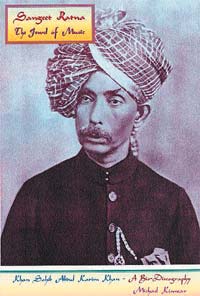|
BOOK REVIEW:
“Sangeet Ratna: The Jewel of Music “- A Bio-discography

Michael Kinnear,
Khan Abdul Karim Khan – A Bio-Discography (Australia: Bazakhana, 2003),
290 pages. Price Australian $65 plus postage. ISBN 0
957735553 Paperback 22.5x16 cm
Mr. Michael Kinnear has published this book from
Australia recently. Around 1973, Mr. Kinnear chanced to listen to Abdul
Karim Khan’s gramophone records and was fascinated with the music. He then
decided to write a bio-discography of Karim Khan. This book is the outcome
of painstaking research conducted over thirty years.
Khan Saheb Abdul Karim Khan (1873-1937) was a legendary
Indian vocalist of the 20th century. Born in the village of Kairana in
North India, Abdul Karim Khan left his native place in 1890, never to
return. He spent most of his active life as a musician in Maharashtra.
Initially he served in the state of Baroda state. He had to flee from that
service due to his association with Tarabai Mane, a student who was also a
member of the Baroda royal family. They settled at Miraj in south
Maharashtra. He established Music schools (Sangeet Vidyalayas) at Belgaum,
Miraj, Pune and in Bombay. He also pioneered ticketed shows of classical
music. These were organized in order to collect funds in aid of the
schools that he had established. He also served in the state of Mysore,
where he was honored with the title ‘Sangeet Ratna’. This book traces the
life of Karim Khan, and his pioneering work as teacher, researcher, and
popularizer of Indian classical music. Half the book is devoted to his
musical as well as personal life. His wife Tarabai Mane left him in 1922.
She worked hard to set up careers in music for her five
talented children: Abdul Rehman (Sureshbabu Mane), Champakali alias
Champutai (Heerabai Barodekar), Gulab (Kamalabai Barodekar), Sakina alias
Chotutai (Saraswati Mane {Rane}) and Abdul Hamid alias Papa (Krishnarao
Mane). The separation was a big jolt to Karim Khan, and although he
continued his career, his music changed after that, and became full of
pathos and sorrow. He later married another disciple, Bannubi Latkar, and
settled in Miraj. He passed away on a railway platform in 1937 while
returning from a concert tour from South India.
The second half of the book describes his gramophone
records (discography). Khansaheb made recordings in two sessions – first
in 1905 in Bombay at S. Rose & Co. – a place near the present location of
Rhythm House, opposite the Jehangir Art Gallery. He cut 32 songs, each of
90-150 seconds duration. The singing on these early records is quite
forceful and exhibits his skills at a very young age. About 22 of these
songs were reissued by HMV in 1994 as part of the ‘Chairman’s Choice’
series. He then refused all the offers for recording. In 1932, however,
Bai Sundrabai persuaded him to cut records for the German Odeon company,
then conducting recordings in Bombay. During 1932-36, he recorded over 25
songs, each of 4-5 minutes duration. These included classical, light
classical, Marathi drama songs, bhajans, Canarese songs as well as
instrumental music for the Been. Michael Kinnear gives a detailed and
professional discographic account of the records, along with label
photographs of discs and of the test records that were sent to Karim Khan
for his approval prior to issuing in market.
This book also gives an historical account of several
important events that took place in Karim Khan’s period. We have details
about the lives, professional careers, and recordings of Tarabai and her
children, Abdul Karim’s brothers Abdul Latif and Abdul Haque, his uncle
Abdul Wahid Khan, as well as other vocalists of the period, such as
Rahimat Khan Huddu Khan, Roshan Ara Begum and Saraswatibai Mirajkar (Bannubai
Latkar)
The book is lavishly decorated with a large number of
black and white photographs and maps, as well as a nice portrait of Karim
Khan on cover. The back page shows Karim Khan in a recording session for
‘Odeon’. In 1973, in commemoration of Abdul Karim’s birth centenary, Mr.
Balkrishnaboa Kapileshwari published a 900-page book on Abdul Karim in
Marathi. An English translation was published subsequently. However, there
has been no other book before this on life, music, and records. Khan
Saheb’s records have been reissued in LP and cassette format, and on
compact disc. This book will provide the listeners
with an account of Abdul Karim Khan’s life, and add to their listening
pleasure.
Suresh Chandvankar,
Hon. Secretary, Society of Indian Record Collectors
Email: chandvankar@yahoo.com
|
